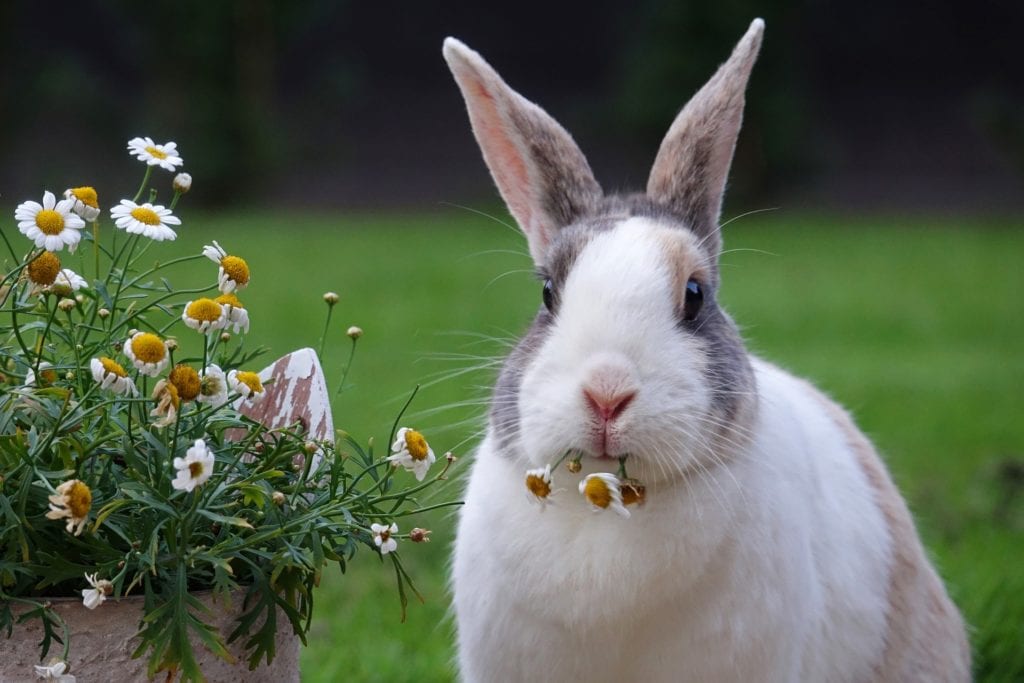Domestic rabbits are a common pet kept by owners with varying experience. They are adorable animals that can live beyond eight years when given the proper care, including a proper diet. So what are the most common types of feed for rabbits?
Rabbits are herbivores, meaning they only eat plants (no meat or dairy), and they are grazing animals, so they tend to eat during all of their waking hours. Keeping a constant supply of fresh water and the right foods will extend a rabbit’s lifespan and quality of life. To do this, it’s a good idea to give them the right feed for rabbits: a mix of rabbit pellets, hay, vegetables and a few daily treats.
Pellets
Rabbit pellets, also often labeled as rabbit food, are dry pellets that are full of fiber-rich ingredients like soybeans and wheat. Rabbit pellets can be found at virtually any pet supply store, both online and in-person, in bags ranging from 5–25 pounds. Rabbit owners should carefully choose the weight of the bag and never buy more than a rabbit can eat within six weeks, or else the pellets can spoil.
Leave the rabbit pellets in a dish in the rabbit’s enclosure and fill the dish once a day. An adult rabbit's daily serving is about 1/4 cup of pellets per every five pounds of the rabbit’s body weight, while younger rabbits—up to one years of age—may be given an unlimited quantity of pellets.
Oxbow Essentials Adult Food for Rabbits
This rabbit food for adult rabbits is a great choice since it includes all of the nutrition a rabbit needs, that is, aside from the nutrition that should also be given with fresh hay. It contains tons of protein, fiber and vitamins, and it is only made with farm-fresh ingredients.
Vitakraft Menu Alfalfa Pellets
For rabbits of any age, this rabbit feed choice is one of the healthiest rabbit foods out there. Not only are these pellets colorful, but they also nutritious since they are made from concentrated grains, vegetables and fruits. Also found in the food blend are alfalfa pellets; each bag comes with a resealable opening to help keep your bunny's food as fresh as possible.
Manna Pro Small World Complete Food
For bunnies with food sensitivities, this food by Manna Pro is a great choice because it omits corn from its list of ingredients. It is also designed with flavor in mind and provides high amounts of fiber, making it one of the best types of rabbit food overall. The bag sizes for this food are offered in multiple weights, too, so you don't have to worry about storing a large bag if you don't want to.
Hay
Hay is considered the most essential part of a rabbit’s diet and must be available for a rabbit to consume around the clock. Younger rabbits can be given alfalfa hay, which is a protein- and calcium-rich hay. Adult rabbits, though, should only be given Timothy hay. Both of these types of hay can be found at most pet supply stores. By consuming lots of hay, rabbits are able to keep their digestive tracks healthy and prevent blockages, such as hairballs.
Kaytee Natural Timothy Hay
Made with just one ingredient, Timothy hay from the Columbian River basin, this natural hay is perfect for feeding your rabbit every day. The hay itself is sun-cured, meaning it is created by a natural process and it's full of crude fiber and protein.
Oxbow Western Timothy & Orchard Hay
This hay by Oxbow is specifically recommended by veterinarians for rabbits because it is made without any artificial ingredients or preservatives. Since there are two types of hay found in the bag, too, you can ensure your rabbit is getting a variety of nutrition.
Vegetables
Wild rabbits get most of their nutrition from vegetables, so it only makes sense to feed pet rabbits fresh greens, too. However, many new rabbit owners believe that all vegetables can be given to their furry companions, and this is not the case.
Rabbits should be given leafy greens that are high in fiber and low in carbohydrates, such as:
- Romaine lettuce
- Carrot tops
- Basil
- Cilantro
- Mint
- Bok choy
- Celery
- Cucumbers
- Raspberry leaves
- Broccoli stems and leaves
Rabbits should not be given any vegetables that are high in carbohydrates, such as:
- Potatoes
- Eggplant
- Avocado
- Peas
- Corn
- Cauliflower
- Rhubarb
- Tomato leaves
Some vegetables have a moderate amount of carbohydrates but can still be given in limited quantities, meaning once every two days, such as:
- Carrots
- Broccoli (flowerets)
- Squash
- Kale
- Brussel sprouts
- Parsley
- Dandelion greens
- Bell peppers
- Tomatoes
- Zucchini
- Cabbage
- Edible flowers, such as roses, pansies and hibiscus
Treats
All pets deserve a good treat every once in a while, but what can rabbits eat as a treat? For these little guys, certain fruits, like apples, grapes, mangoes, papayas, peaches, pears and berries are great. The maximum serving of treats is up to two tablespoons every two days, as fruits contain a high amount of sugar and will upset the digestive track of a rabbit when given more than that.
Rabbits have a varied, albeit specific, diet that owners can easily provide. When this diet is fed daily to a rabbit, the rabbit’s digestive and overall health will be maintained for years to come.
Oxbow Simple Rewards Oven Baked Treats
Oxbow's Oven Baked Treats are available in a wide variety of flavors, from apple and banana to bell pepper. These treats are formulated to work alongside a complete rabbit diet; they do not provide high amounts of calcium and protein to ensure your rabbit does not take in too much. They are also made with real fruits and vegetables and do not include any artificial colors.
Vitakraft Slims Carrot Crispy Nibble Stick Treats
These treats by Vitakraft are a great snack for all small animals, including rabbits, since they are light and won't fill up your bunny's stomach too quickly. They are popularly used as dental sticks although they may also be used as rewards in training sessions. They are made from real carrots and contain no added sugars.










